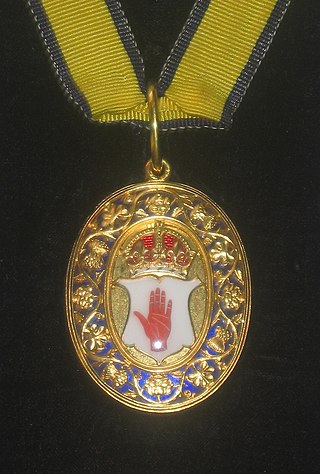
A baronet or the female equivalent, a baronetess, is the holder of a baronetcy, a hereditary title awarded by the British Crown. The title of baronet is mentioned as early as the 14th century; however, in its current usage it was created by James I of England in 1611 as a means of raising funds for the crown.

Duke of St Albans is a title in the Peerage of England. It was created in 1684 for Charles Beauclerk, 1st Earl of Burford, then 14 years old. King Charles II had accepted that Burford was his illegitimate son by Nell Gwyn, an actress, and awarded him the Dukedom just as he had conferred those of Monmouth, Southampton, Grafton, Northumberland and Richmond and Lennox on his other illegitimate sons who married.

Earl of Orford is a title that has been created three times.

There have been five baronetcies created for persons with the surname Barker, three in the Baronetage of England, one in the Baronetage of Great Britain and one in the Baronetage of the United Kingdom. All five creations are extinct.

There have been two baronetcies created for persons with the surname Alston, both in the Baronetage of England. Both creations are extinct.

Sir Robert Burdett, 3rd Baronet DL was an English baronet and Tory politician.
There have been three baronetcies created for persons with the surname Denny, one in the Baronetage of England, one in the Baronetage of Ireland and one in the Baronetage of the United Kingdom. As of 2014 two of the creations are extant.
There have been four baronetcies created for persons with the surname Rich, two in the Baronetage of England, one in the Baronetage of Great Britain and one in the Baronetage of the United Kingdom. As of 2008 three of the creations are extinct while one is dormant.
There have been three baronetcies created in the Baronetage of England for members of the Skipwith family of Skipwith, Yorkshire, which relocated to Lincolnshire in the 14th century. They were a successful court family, with one member, Margaret Skipwith, seen as a possible queen of England after the death of Henry VIII's third wife, Jane Seymour. One creation of the baronetcy is extant as of 2008.

There have been four baronetcies created for members of the ancient House of Beaumont, all in the Baronetage of England. All four creations are extinct or dormant.
The Bellot Baronetcy, of Moreton in the County of Chester, was a title in the Baronetage of England. It was created on 30 June 1663 for John Bellot of Great Moreton Hall, near Astbury, Cheshire, who was High Sheriff of Staffordshire in 1661. He came from an ancient Cheshire family, and was the eldest son of John Moreton and Ursula Bentley. The second Baronet was several times Member of Parliament for Newcastle-under-Lyme. The baronetcy became extinct on the death of the fourth Baronet in 1714. The Moreton estate was sold on his death.
The Warburton Baronetcy, of Arley in the County of Chester, was a title in the Baronetage of England. It was created on 27 June 1660 by Charles II for George Warburton, of Arley Hall, Cheshire, whose great-uncle had been Sergeant at Law and a Justice of Common Pleas in the time of Charles I. The Warburton family removed from Warburton, Cheshire to Arley in the 14th century. The third Baronet was a Knight of the Shire for Cheshire. The title became extinct on the death of the fifth Baronet in 1813. The Cheshire estates passed into the Egerton-Warburton family and then to Viscount Ashbrook.
The Copley baronetcy was first created for Godfrey Copley on 17 June 1661. He was High Sheriff of Yorkshire for 1676–77.
Sir Thomas Beaumont, 1st Baronet was an English politician.
Sir Henry Beaumont, 2nd Baronet was an English politician.

The Filmer Baronetcy, of East Sutton in the County of Kent, was a title in the Baronetage of England. It was created on 26 December 1674 for Robert Filmer, of East Sutton Place, East Sutton, Kent. He was the grandson of Sir Edward Filmer, of Little Charleton, High Sheriff of Kent in 1616, who married Elizabeth Argall of East Sutton and purchased the estate there from her brother. His son Sir Robert Filmer, father of the first Baronet, was a supporter of the Crown during the English Civil War. The baronetcy was created for his son, also Robert Filmer, after the Restoration of Charles II in his honour.

Thomas Cromwell, 1st Earl of Ardglass, 11 June 1594 to 20 November 1653, was an English nobleman, son of Edward Cromwell, 3rd Baron Cromwell and his second wife Frances Rugge.
The Cropley Baronetcy, of Clerkenwell in the County of Middlesex, was a title in the Baronetage of England. It was created on 7 May 1661 for John Cropley. The second Baronet sat as Member of Parliament for Shaftesbury. The title became extinct on his death in 1713.
The Cobb Baronetcy, of Adderbury in Oxfordshire, was a title in the Baronetage of England. It was created on 9 December 1662 for Thomas Cobb. The title became extinct on the death of the third Baronet on 29 March 1762.

Sir Edmund Denton, 1st Baronet, of Hillesden, Buckinghamshire, was an English Whig politician who sat in the English and British House of Commons from 1698 to 1713.










